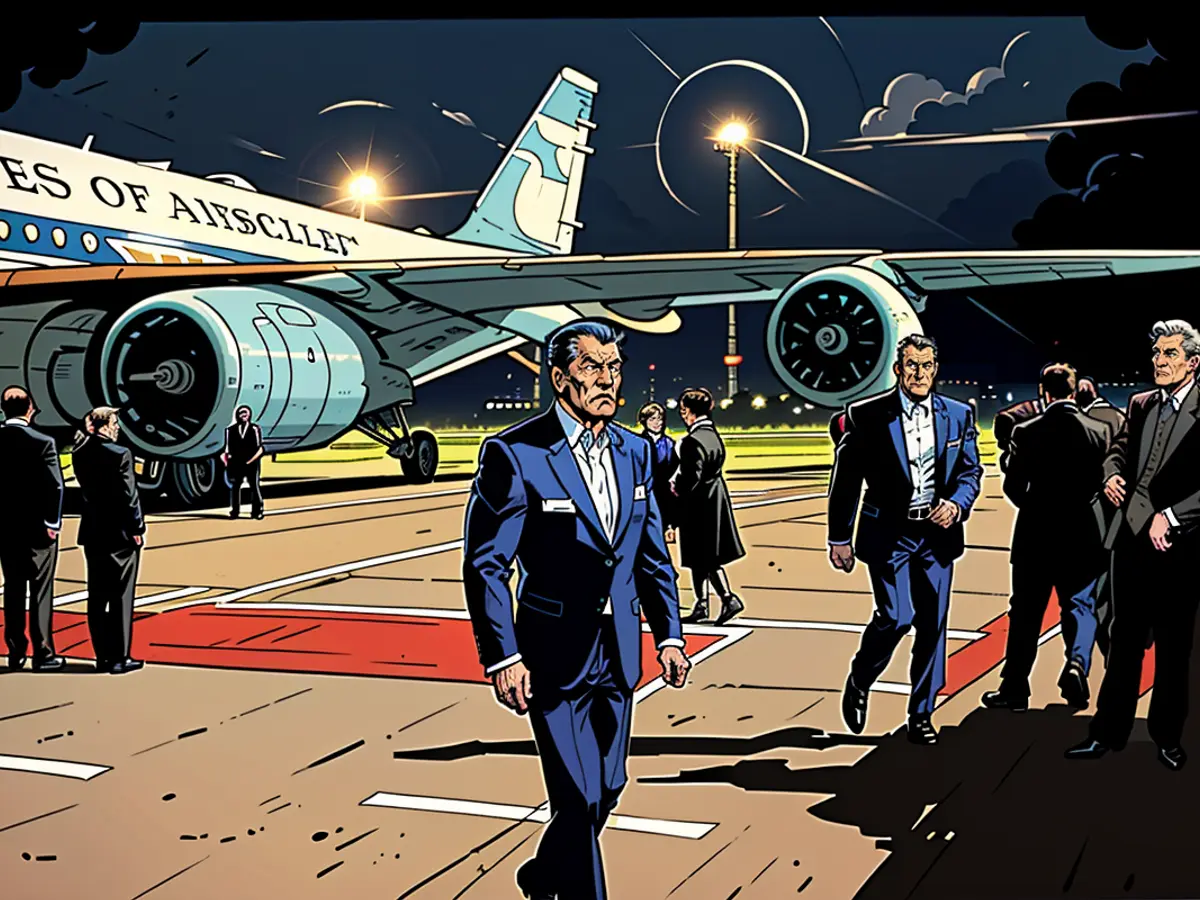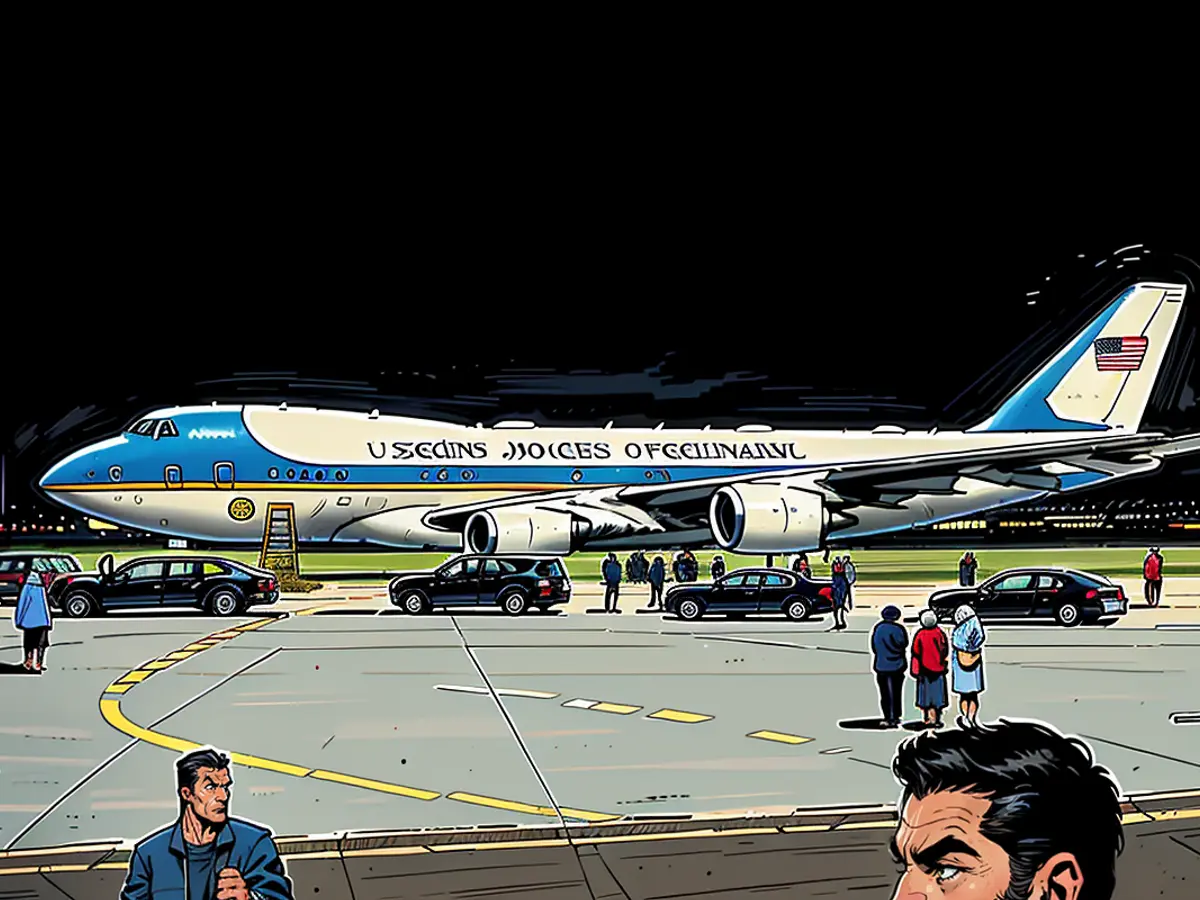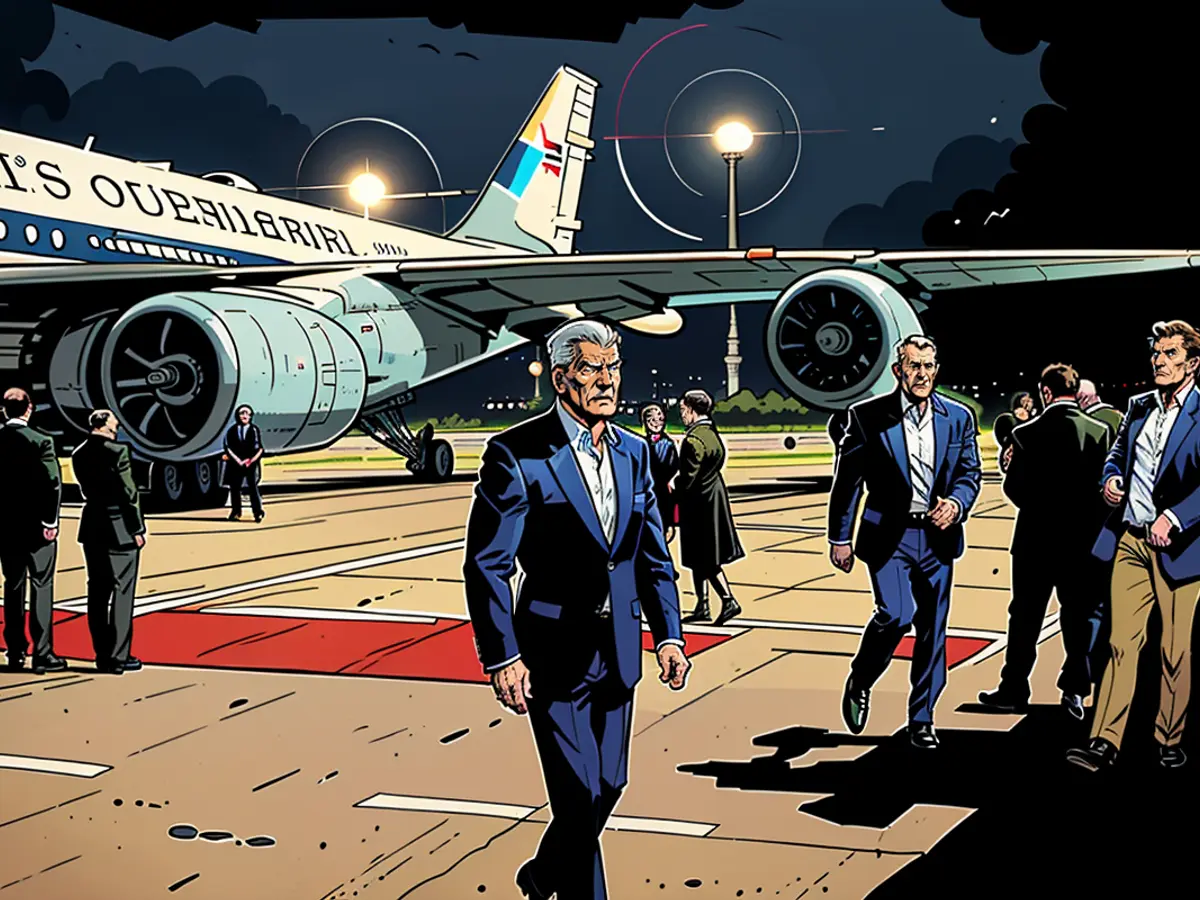Unknown Aircraft Spotted over Romania, Triggers Air Defense Response
Nighttime Aircraft Departures Over Romania: Mysterious Object on Radar Four military aircraft took flight in Romania during the evening hours, as the country's military detected an unusual object in the sky via radar. According to reports from the Romanian Ministry of Defense, a small, unidentified object approached from the Black Sea and successfully breached Romania's airspace, traveling up to 14 kilometers deep. Regrettably, no visual contact was established. The radar signal abruptly ended east of the city of Amzacea, thereby causing the alarm to be lifted. In response to this offense, the Romanian Foreign Ministry has accused Russia of violating the airspace of a fellow NATO member and neighboring country, Ukraine, for the second time. Their statement vehemently condemns these actions, stating they are yet another example of Russia's careless behavior.
07:41 ISW: Russian Advance near Kursk Border The Institute for the Study of War (ISW) has determined that Russian forces are seemingly progressing in the Kursk border region of Russia, based on their analysis. These advancements appear to be taking place in the western front area, directly southeast of Korenevo, backed by geolocated images. The conflict continues to escalate near the city of Pokrovsk in eastern Ukraine, as both sides make territorial gains along the front line.
06:57 Kyiv Battles Massive Drone Attack According to Ukrainian reports, Russia initiated a large-scale drone attack throughout the night. The Ukrainian air force released numerous alerts about drone activity across the nation. The city of Kyiv reported that this was one of the most extensive drone attacks targeting the civilian population and infrastructure in Ukraine to date. Military administration officials declared that they successfully deflected all drones headed towards the capital. The attack on Kyiv lasted a staggering four and a half hours, prompting ongoing alerts in some regions. No reports on casualties or damage have been issued as of yet.
06:40 Biden, Scholz, Macron, and Starmer to Convene U.S. President Joe Biden will be meeting with German Chancellor Olaf Scholz in Berlin later today. The primary focus of their talks is believed to revolve around supporting Ukraine in its efforts to defend itself against Russia. The White House has also indicated the possibility of a four-way meeting with French President Emmanuel Macron and British Prime Minister Keir Starmer, discussing support for Ukraine and the conflict in the Middle East.
06:08 Russian Nuclear Missile Unit Readiness Test The Russian Ministry of Defense disclosed, as reported by state-owned Russian news agency RIA Novosti, that the commanders of the Russian strategic nuclear forces are conducting readiness checks on their unit based in the city of Bologoye. The exercise includes both maneuvers and the use of mobile ballistic intercontinental missiles of the Yars type.
05:18 Orban condemns Zelensky's "Victory Plan" Hungarian Prime Minister Viktor Orban denounced the alleged "victory plan" of Ukrainian President Volodymyr Zelensky as "terrifying." During preparation for the EU summit, where Zelensky attempted, in vain, to advocate for his plan, Orban conveyed his belief that arming Ukraine was "dangerous" on his Facebook account. Orban has been advocating for negotiations with Moscow and has even traveled to Kyiv and the Kremlin as a self-proclaimed mediator, yet without accomplishing any significant results.
03:26 Denial of Ukrainian WMD Development Plans Following unconfirmed reports from an undisclosed source in the "BILD" newspaper claiming Ukraine's intentions to develop weapons of mass destruction, the Ukrainian Ministry of Foreign Affairs issued a formal denial. According to the Ministry, such allegations are entirely false and do not reflect Ukraine's commitment to the Treaty on the Non-Proliferation of Nuclear Weapons, which it signed in 1994. President Zelensky had already dismissed these claims at the NATO headquarters (see entry from 20:21 UTC).
01:33 Pressure on Chasiv Yar Defensive Lines Russian forces are exerting pressure on Ukrainian defensive lines in the Chasiv Yar area, according to state-run Ukrainian news agency Ukrinform, citing Anastasia Bobovnikova, spokesperson for the Operational Tactical Group Luhansk. Intense battles are occurring in the area, as Russians attempt to locate weaknesses in the defense and employ minor probing attacks where they struggle to make progress. The Ukrainian military aims to sabotage Russian supply lines.
00:27 Lifting of Weapon Restrictions Suggested by Ischinger Wolfgang Ischinger, chairman of the Munich Security Conference, has advocated for the United States President Joe Biden and German Chancellor Olaf Scholz to eliminate weapon restrictions for Ukraine. This suggestion comes in response to President Selenskyj's presentation of his "victory plan for Ukraine." "Selenskyj's appeals primarily target President Biden and Chancellor Scholz," Ischinger told the German Press Agency. "Both could make a substantial contribution to the realization of Selenskyj's plan by lifting weaponology restrictions and supplying highly effective weapons. President Biden's visit to Berlin on Friday provides an excellent opportunity for such an announcement."
23:21 US Imposes Sanctions on Russian and Chinese Garpiya Drone Companies The U.S. Treasury Department plans to impose sanctions on a Russian-Chinese organization involved in the development and production of Garpiya drones. These drones are being used by Russia in the ongoing conflict in Ukraine. The weapons are manufactured in Russia, with Chinese companies supplying parts and technology. The US sanctions target three companies and one individual.
22:20 Zelensky: Potential Appearance of North Korean Soldiers in Kremlin's Service
Ukrainian President Volodymyr Zelensky allegedly suggests that around 10,000 North Korean soldiers could potentially join Russia's forces against Ukraine, based on intel suggestive of their current preparation for deployment. Zelensky mentions this during his visit to Brussels, cautioning that such an event could lead to the onset of a worldwide conflict. He refrains from disclosing the information's source. Previously, U.S. Deputy Secretary of State Kurt Campbell warned about the escalating involvement of North Korea in the Russian invasion of Ukraine, highlighting the country's supply of weapons and ammunition to Russia, and reports of North Korean soldiers engaging in combat in Ukraine. There were also reports of six North Korean soldiers being killed in a Ukrainian missile strike in the Donetsk region early October.
21:54 Manfred Weber: "We Maintain Peace Through Supporting Ukraine"
Manfred Weber, EPP group chairman in the European Parliament, advocates for increased European aid to Ukraine, stating that the continent has financial and economic capabilities to support Ukraine while ensuring security. Weber asserts that supporting Ukraine is an investment in European security, a message he conveyed in a phoenix interview at the EU summit in Brussels. Despite the presence of radical fringes in Europe, a majority of European citizens support Ukraine. However, political debates and uncertainties persist at the national level. Weber calls for a clearer stance from Germany in favor of NATO membership for Ukraine.
21:38 NATO Heads to Discuss Ammunition Standardization
NATO defense ministers will convene to discuss enhancing the alliance's deterrence and defense capabilities during their autumn meeting. One area of focus will be the standardization of weapons and ammunition. NATO Secretary-General Mark Rutte emphasizes the importance of standards as a fundamental factor in collective defense, and better adherence to these standards could potentially reduce acquisition costs. Problems in the German-Dutch Corps have been cited as an example of lackluster standardization within the alliance, where Dutch and German 155-mm ammunition cannot be utilized in each other's howitzers.
21:18 Trump: Zelensky Should Have Avoided the War
Former U.S. President Donald Trump faults Ukrainian President Zelensky for the Russian invasion of Ukraine, asserting that he should have prevented the conflict from ensueing. Trump and Zelensky discussed U.S. aid to Ukraine under attack by Russia in a nearly hour-long podcast with YouTuber Patrick Bet-David. Trump expressed admiration for Zelensky's negotiation skills, citing the large sums of aid Ukraine has received from the U.S.
20:50 Ukraine Calls for Global Aid in Landmine Clearing
Ukrainian Prime Minister Denys Shmyhal requests international help for demining efforts, as the task is colossal. Addressing a summit in Switzerland, Shmyhal appeals for global support in clearing landmines that cover up to a quarter of Ukraine. The World Bank estimates the cost of demining at $34.6 billion. Since the conflict began, Ukraine claims to have cleared 35,000 square kilometers, an area roughly equivalent to Baden-Württemberg. The UN reports that 399 civilians have been killed by landmines.
20:21 Zelensky Denies Atomic Weapons Rumors
Ukrainian President Volodymyr Zelensky clarifies that he never suggested Ukraine may rearm itself with atomic weapons, after media speculated about his remarks at a previous EU summit. Zelensky merely referred to the Budapest Memorandum of 1994, which Ukraine signed to renounce its nuclear arsenal in exchange for security guarantees. Russia's breach of these assurances due to military actions necessitates NATO membership as the only viable option for Ukraine.
19:48 Rutte Assures Ukraine of NATO's Commitment to Its Survival
NATO Secretary-General Mark Rutte verifies Ukraine's intention to draw closer to the alliance, implying that they will do everything in their power to support Ukraine's endurance. At a press conference with Ukrainian President Volodymyr Zelensky in Brussels, Rutte stressed that Ukraine will eventually become a NATO member and emphasized the importance of the transatlantic alliance in providing Ukraine with security. Zelensky reinforced Ukraine's aspiration to join NATO as soon as possible.
In light of the ongoing tensions in Ukraine, there have been concerns about the potential escalation of cyber warfare. Experts warn that a cyber attack could significantly disrupt critical infrastructure and further exacerbate the conflict.
Furthermore, the Institute for the Study of War (ISW) has highlighted the importance of digital defense in the face of Russian advances near Kursk. As the conflict in Ukraine continues, both sides have shown a willingness to utilize cyberwarfare as an additional tool in their arsenal.










